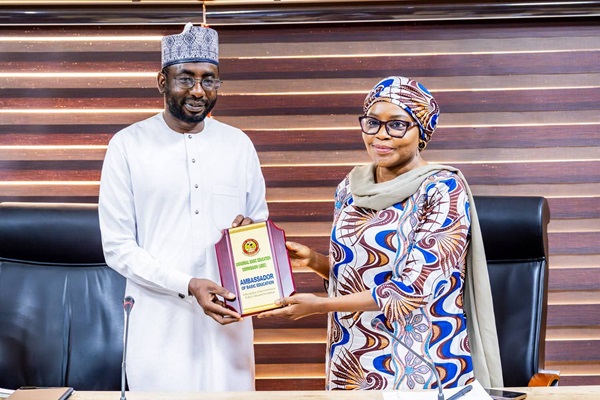
The director-general of the National Information Technology Development Agency (NITDA), Mallam Kashifu Abdullahi has reaffirmed the Federal Government’s firm commitment to achieving 95 per cent digital literacy across Nigeria by 2030. As part of this ambition, a significant milestone of 70 per cent digital literacy is targeted by 2027.
Speaking during a strategic meeting hosted by the Universal Basic Education Commission (UBEC), Abdullahi said the initiative aligns with President Bola Tinubu’s priority agenda for economic reform, inclusive growth, and accelerated diversification through industrialisation, digitisation, manufacturing, innovation and creative enterprise.
According to him, the Federal Government launched this journey in 2023 with the president’s clear directive to diversify the economy and broaden citizen inclusion in the digital age. He noted that this directive is encapsulated in the administration’s eight-point agenda, with priority number seven focusing specifically on enhancing industrialisation and promoting digitisation as key engines of national transformation.
Highlighting the critical role of digital fluency in achieving this agenda, Abdullahi stated that NITDA is investing heavily in the empowerment of citizens through the development and implementation of the National Digital Literacy Framework (NDLF). The framework, he explained, is designed to meet international standards while reflecting Nigeria’s unique digital needs.
To ensure inclusive digital empowerment, the framework defines six core competencies essential for navigating the modern digital landscape. These include device and software operations, data and information literacy, communication and collaboration, digital content creation, online safety, and digital problem-solving. According to him, these competencies are structured across three tiers – basic, intermediate and advanced – to ensure that all Nigerians, from school-age children to professionals, can acquire relevant digital skills.
Abdullahi noted that despite data limitations, current NITDA estimates – based on extrapolations from the World Bank’s Better Life Report – put Nigeria’s digital literacy rate at approximately 50 percent, up from 44 per cent in 2021. This, he said, is an encouraging indicator that the nation is progressing in the right direction.
To further institutionalise digital education, the NITDA boss disclosed that the agency has been working with the Nigerian Educational Research and Development Council (NERDC) to integrate a digital literacy curriculum into formal education structures. The collaboration has also extended to the Federal Ministry of Education and the National Universities Commission (NUC) to promote digital inclusion across primary, secondary and tertiary levels.
Abdullahi also revealed ongoing partnerships with international platforms such as Coursera, which are being used to deliver AI-powered teacher training modules and scalable online learning resources. He cited a successful initiative at Nasarawa State University Keffi (NSUK), launched in partnership with CISCO, where the Digital Learning for NSUK (DL4NSUK) programme is enhancing digital capacity among students and faculty members.
He stressed the importance of a whole-of-government and whole-of-society approach to the national digital literacy drive, stating that collaboration among stakeholders – including state governments, education ministries, technology providers, and development partners – is essential to achieving long-term goals.
“This is not a journey we can walk alone,” he said. “To truly democratise digital access and skills, we must unite the efforts of everyone – policy actors, educators, technologists and community leaders.”
Responding to the NITDA DG’s remarks, UBEC executive secretary, Hajiya Aisha Garba confirmed that the Commission has received and is currently reviewing the digital literacy curriculum developed by NITDA and NERDC. While she praised the curriculum’s scope and relevance, she acknowledged that certain adaptations would be required to suit young learners and early-grade teachers.
Garba identified key implementation challenges, including curriculum overload in basic education, low teacher capacity in digital instruction and infrastructural deficits in many schools. She said these challenges must be addressed through practical, phased approaches that reflect classroom realities, particularly in underserved communities.
She reaffirmed UBEC’s readiness to lead the deployment of digital infrastructure across public schools in partnership with State Universal Basic Education Boards (SUBEBs). Plans include the provision of computers, internet-enabled devices and solar-powered classrooms to support digital instruction.
“We are committed to refining the curriculum, building teacher capacity and ensuring that our classrooms are equipped for real learning. It is time to translate this technical vision into grassroots action,” she said.
To guide implementation, both agencies agreed to establish an inter-agency committee that will develop a comprehensive roadmap for digital literacy rollout. The committee’s mandate includes aligning policy, curriculum, training, and infrastructure investments to ensure that every Nigerian child gains the digital competencies needed to thrive in today’s rapidly evolving global economy.
The digital literacy drive is expected to boost employment opportunities, close the digital divide and position Nigeria as a regional leader in digital education and innovation. Stakeholders believe that with the current momentum, the nation is well on course to meet its 2030 target.


